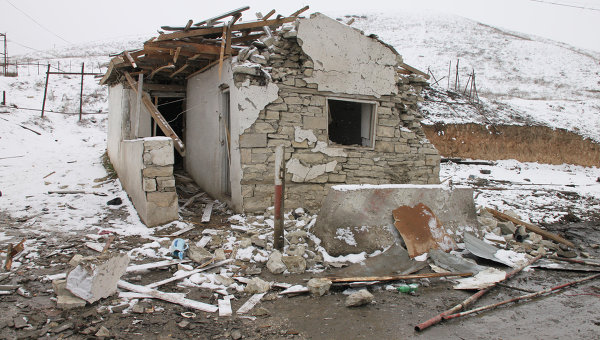
Conflict in Dagestan Approaches the Level of Civil War
Publication: Eurasia Daily Monitor Volume: 8 Issue: 33
By:

On February 14, a double suicide attack took place in the Dagestani village of Gubden. Two servicemen were reportedly killed and 20 others were injured in the attack. First, a female suicide bomber attacked a local police station early in the evening (RIA Novosti, February 14). Later that evening, a car loaded with explosives tried to approach a police checkpoint in the same village and exploded during a shoot out between its driver and policemen and Russian interior ministry servicemen (www.riadagestan.ru, February 14).
Within hours of the attack, police sources said that Vitaly Razdobudko and his wife Maria Khorosheva, both ethnic Russian converts to Islam, were the suicide bombers. The suicide attack was supposedly designed to be a prologue to an all-out insurgent assault on Gubden. The attack seriously disrupted life in the settlement, as its electricity was cut while Russian and Dagestani security forces dug in to thwart a possible incursion by the rebel forces (www.lifenews.ru, February 14). On February 15, investigators confirmed they were looking into the possibility that ethnic Russian Islamists participated in the attack but denied the bombers had been identified. Meanwhile, one of the servicemen wounded in that attack died (www.gazeta.ru, www.kavkaz-uzel.ru, February 15).
The scale and scope of the conflict in Dagestan increasingly resemble a civil war. While the insurgents cannot rival the government forces in terms of weaponry and ability to fight in open combat, the rebels are carrying out psychologically damaging attacks with suicide bombers across Russia. Islamism has firmly become the matrix of the insurgency in a republic with the most ingrained and ancient Islamic tradition in the North Caucasus.
The ethnic Russian converts to Islam Vitaly Razdobudko and Maria Khorosheva first came to public attention in the wake of the attack at Moscow’s Domodedovo airport on January 24. Russia’s security forces initially stated that Razdobudko, aided by the so-called Nogai Jamaat, perpetrated the bombing at the airport, which killed 36 people. This version of events was subsequently dropped and the Domodedovo attack was eventually blamed on a young Ingush man. Now Razdobudko and his girlfriend have unexpectedly resurfaced in Dagestan.
Gubden is a Dargin village in Karabudakhkent district of Dagestan, which is situated south of Makhachkala and west of Izberbash, a resort city on the Caspian Sea. The district has plains and mountainous areas and is known for its vibrant and volatile Islamic community, which regularly challenges the official establishment. Gubden is the home village of Magomedali Vagabov, a Dagestani insurgent leader who was killed in August 2010. The current leader of the Dagestani insurgency, Ibragimkhalil Daudov, who became leader following Vagabov’s death, also comes from this village. Daudov, who was in the Soviet army and participated in the invasion of Afghanistan, joined the Dagestani insurgency along with his three sons. His wife Zavzhat reportedly accidently blew herself up in Moscow on December 31 while preparing a suicide attack (www.gazeta.ru, February 15).
It is quite baffling as to why the Russian security services are so persistently trying to bring charges against ethnic Russians who are supposedly Islamists. Following the attack at Domodedovo airport, Gazeta.ru conducted thorough research on the alleged suspects. It turned out that local police in Stavropol region and Dagestan had learned about Razdobudko from the news. The head of the Neftekumsk city police in Stavropol region, where Vitaly Razdobudko had reportedly lived, told the website: “We never had such a person in our database and he never lived here” (www.gazeta.ru, January 27).
One possible reason for Razdobudko’s rise to prominence in the statements of the Russian security services is that the latter are trying to temper anti-Caucasian sentiment among ethnic Russians. This task may seem to be all the more relevant to the security services after Russian nationalists staged massive anti-Caucasian protests in Moscow last December. Since the continual terrorism threat in Russia seems to come solely from the North Caucasus, many ethnic Russians may grow impatient both with the inability of the Russian government to deal with the issue and with North Caucasians as such. As the protests in Moscow showed, Russian nationalists could easily overwhelm the state’s ability to control the situation.
Meanwhile, a real or make-believe internationalization of the conflict in the North Caucasus seems to be underway. On February 10, Russian news agencies reported that two insurgents of Kazakh origin surrendered to police in Makhachkala, Dagestan’s capital. The Kazakh embassy in Moscow denied there was any evidence of Kazakh citizens’ participation in the conflict in the North Caucasus. While Russia’s Investigative Committee also did not confirm this information, news spread on February 11 about a group of four to five “Kazakh terrorists” who had infiltrated the North Caucasus in a car (www.time.kz, February 12).
With suicide attacks becoming more and more routine in Dagestan as well as the rest of the North Caucasus, Dagestan’s official Islamic clergy have come up with a proposal to establish a “Shahid’s [Martyr’s] Day” on February 9. The Islamic leaders stated that 24 members of the official Dagestani clergy had died in attacks since 1998 (www.ndelo.ru, February 11). Now the official Islamic establishment in Dagestan appears to be predisposed to acquire their own Shahids as they plan to prepare to recognize those who die in suicide attacks and in other fighting as “Shahids.” This step is likely to cause even more division in Dagestani society and more polarization between official and unofficial Islam, thereby exacerbating the unfolding civil conflict.




